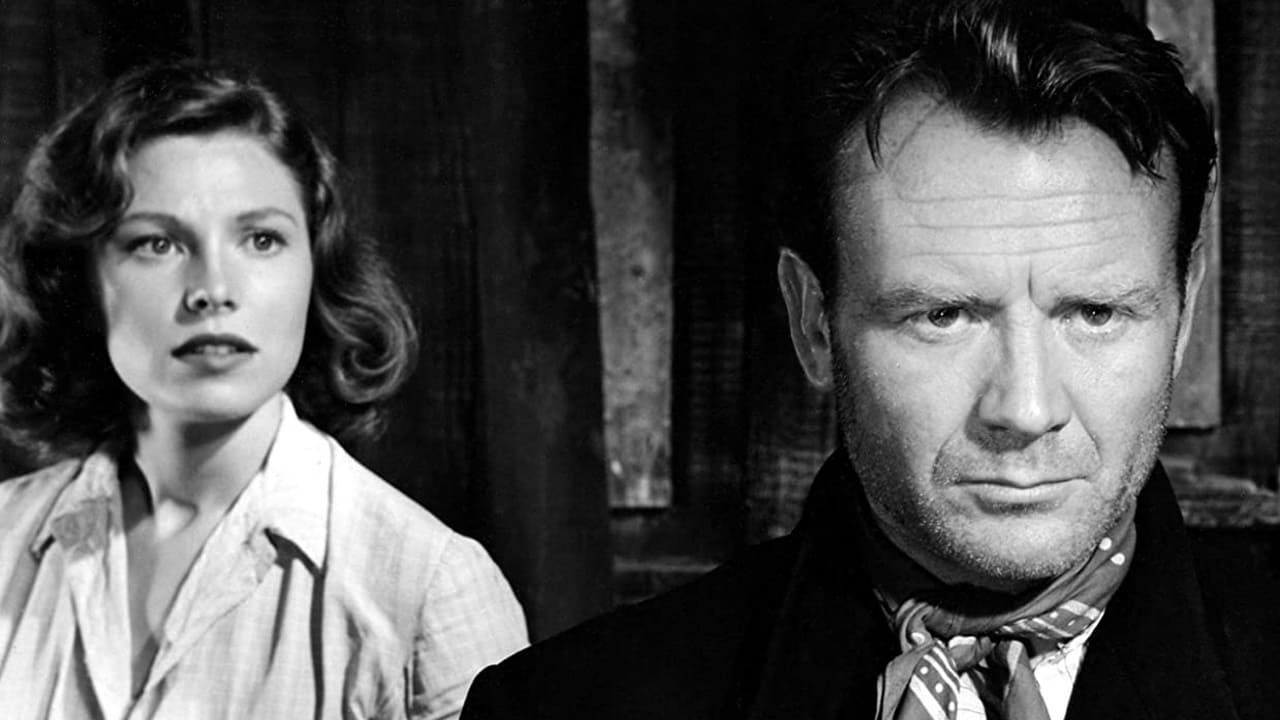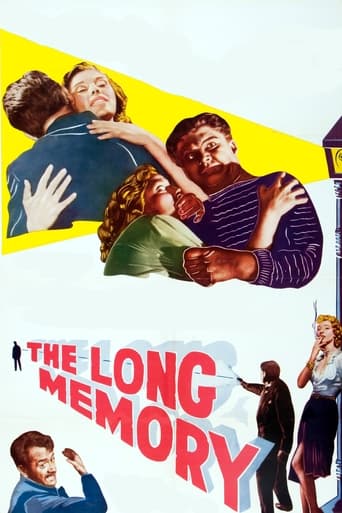

The greatest movie ever made..!
... View MoreSuch a frustrating disappointment
... View MoreThe biggest problem with this movie is it’s a little better than you think it might be, which somehow makes it worse. As in, it takes itself a bit too seriously, which makes most of the movie feel kind of dull.
... View MoreThe movie turns out to be a little better than the average. Starting from a romantic formula often seen in the cinema, it ends in the most predictable (and somewhat bland) way.
... View MoreA pretty good little British thriller which I happened to catch, unexpectedly, on television late one morning. John Mills (slightly miscast as a rough type) plays a guy fresh from doing a 12-year-stretch who decides to get revenge on those who were responsible for him being locked up for all those years. Yes, it's an overly-familiar story still being utilised even today (in the likes of OLDBOY), but it does well with the set-up.Mills sets up a kind of temporary home or shelter on some rotting hulks out on the mudflats and it's a highly effective place to build atmosphere. Sadly, the thriller aspects of the story are slightly less compelling than I was hoping for, although the characterisation is strong. Mills is the consummate professional and the supporting cast give some choice performances, including an early turn for James Bond's M, Geoffrey Keen. There are some great slices of action and chase scenes towards the climax which help to build excitement and make this a solid effort for the British studios of the era.
... View MoreRobert Hamer was not a prolific director; only around a dozen films are credited to him, and because of his serious alcohol problem there is some doubt as to the extent to which he was responsible for some of those, especially his final film, "School for Scoundrels". His career has been described as "the most serious miscarriage of talent in the postwar British cinema", yet during that relatively brief career he was responsible for some of the best British films of the forties and fifties. He is today best remembered for that brilliant Ealing comedy, "Kind Hearts and Coronets", but was capable of producing serious movies as well as comedies; his "It Always Rains on Sunday", for example, is a crime thriller showing the influence of the film noir style.With "The Long Memory" from 1952, Hamer moves even closer in the direction of noir. The plot, based on a novel by Howard Clewes, owes something to Dumas' "The Count of Monte Cristo". A young man is sentenced to imprisonment for a crime he did not commit. Upon his release, he sets out to get revenge upon those responsible for his wrongful conviction, including his treacherous fiancée. The hero, Philip Davidson spends 12 years in prison after being wrongly convicted for murder, a conviction procured by perjured evidence given by his fiancée Fay, her father Captain Driver and a man named Tim Pewsey. Fay's motive for perjuring herself was to protect her elderly father, who had become mixed up in a criminal enterprise with Pewsey and another man named Boyd, the actual murderer.Some purists maintain that film noir was an exclusively American genre, but I have never concurred with that opinion, as there were also a number of British films (and indeed French ones such as "Les Diaboliques") which share the characteristics of noir, and this is one of them. One of the classic noir features is the morally ambiguous lone male hero, and John Mills' Davidson is certainly a character of that type; had this been a Hollywood film he could have been played by Bogart or Mitchum. Although he has been the victim of a grave injustice, and in that sense has a claim on our sympathy, his experiences have made him, in many ways, an unsympathetic character, vindictive and unsociable. After his release he goes to live in a disused barge on the marshes, a dwelling reminiscent of Richard Widmark's wooden shack by the riverside in a great American noir, "Pickup on South Street". Davidson's closest friend is another of life's victims, wartime refugee named Ilse, and he has other allies in his fight to clear his name, including Craig, a journalist, and Superintendent Bob Lowther, a policeman who believes that a miscarriage of justice may have occurred. Lowther's position, however, is made difficult by the fact that he is married to Fay, the woman whose lies were responsible for Davidson's conviction.Other noir characteristics present in this film include dramatic, expressionistic black-and-white photography and a gritty urban setting, with the dingy backstreets of Gravesend (a riverside port east of London and not normally regarded as an important cinematic location) here fulfilling the role which in an American noir would played by Los Angeles or New York. The setting is not, however, exclusively urban; many scenes were shot on the North Kent Marshes, the area around Gravesend and Rochester immortalised by Dickens in "Great Expectations". This marshland landscape around the Thames and Medway Estuaries, an area which I know well, is not conventionally beautiful in the way in which, say, the Lake District or the Cotswolds are beautiful. Indeed, it can often be bleak and forbidding, but it is also powerfully atmospheric. It makes a fitting setting for this tale of crime and revenge and gives the film has a strong sense of place. The film ends with justice being done, but here too there is a note of doubt and uncertainty; it is not, for example, clear whether Lowther's marriage to Fay can survive the revelations about her past.The most famous British noir is probably "The Third Man", a British-made film even though it is set in Vienna. "The Long Memory" is less well-known, but with a strong performance from Mills in the leading role, its powerful storyline and Hamer's atmospheric direction I would place it in the same class as Carol Reed's masterpiece. 9/10
... View MoreWell this gloomy doomey looking film, really set of my miserable day which was just as gloomy and miserable outside. This bleak film set mostly in marsh land added a certain slash wrist genre to this film.Davidson (John Mills) is a man who has just been released from doing a 12 year stint in prison for a crime he did not commit. Seething with revenge, he starts out looking for the people who set him up so he can administer his revenge.I must say, after a while this film was engaging, and I sat through and watched to the end. At times is was slow and wordy but also came over as a bit of early Hitchcock film noir.
... View MoreClearly Mr John Mills either was not aware of that piece of Eastern wisdom or he chose to ignore it.In view of his incarceration for 12 years for a murder he did not commit he would be less than human if he did not at least contemplate bloody vengeance against those who conspired to put him away.In this brilliant little Hitchcockian noir director Mr Robert Hamer makes full use of the wind - scoured mudbanks of the Thames Estuary and peoples them with an almost Dickensian selection of semi - grotesques living in barges,wooden huts and railway carriages on the riverside scrubland. Mr Mills,having fallen on hard times,lives in a timber shack conveniently close to a ramshackle cafe occupied by more sinister characters than you could shake a stick at. His former girl - friend - one of his persecutors - has now married the senior police officer involved in his case and ,by contrast lives a life of almost sybaritic luxury in a big 1930s villa.She and her husband are determinedly middle - class and have a little boy who wears a quartered school cap.They use linen napkins with silver rings for breakfast.She is played by Miss Elizabeth Sellars in typical "1950s repressed English Housewife" mode with plenty of clutching hands and pleading glances.Her husband,Mr John Mcallum,is that almost extinct movie species a detective with a conscience.He runs his hands round his jaw in moments of great emotion,but he doesn't have those too often. Mr John Slater and Miss Thora Hird provide some amusement as an ill - matched couple but the film is mainly a triumph for Mr Mills,whether stalking the mean streets of Gravesend or bearding the villain in his den at the Pool of London.Incidentally,watch out for the great Mr Harold Lang making the most of a small part as viciously camp blond-rinsed minder at the bad guy's HQ. The Thameside chase is reminiscent of M.Jules Dassin's largely forgotten "Night and the City",but the overall feel is most definitely that of Mr. Hitchcock.I doubt if Mr Hamer was consciously constructing a "hommage", but The Master's imprint can be seen in many of the exteriors and in the relationship between the detective and his wife. Mr Mills has one exquisite faux pas near the end.Up till then his character has been resolutely genteel,but,as he lies bleeding from a bullet wound,the detective asks how he is."It's only me arm",he grits, reverting in extremis to the Lower Deck. "The Long Memory" deserves a place alongside "The Blue Lamp" and "It always rains on Sundays" in the pantheon of British noirs which,with the passing of time,are being recognised as the seminal works that have hugely influenced the TV and movie industry in the second half of the 20th century and beyond.
... View More